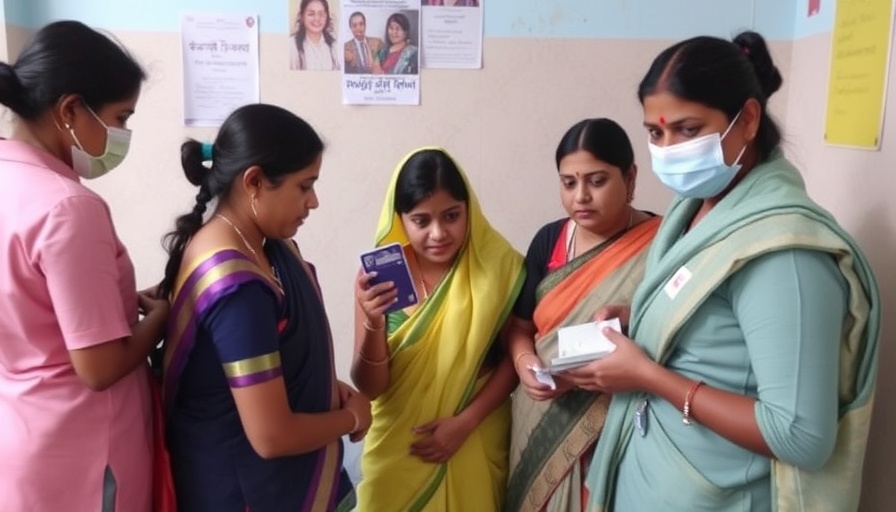
Decommissioning the Old: Why India's Health System Needs an Upgrade
In an era where digital transformation is the cornerstone of efficiency in healthcare, India's Ministry of Health and Family Welfare (MOHFW) has taken a significant step forward by decommissioning the Central Government Health Scheme's (CGHS) Health Management Information System (HMIS), which had served the nation since 2005. This decision reflects a commitment to modernizing the tools that enable comprehensive healthcare for employees and retirees of the central government.
What's Wrong with the Old HMIS?
The legacy HMIS system was increasingly unable to meet contemporary IT standards and user expectations. As healthcare continues to evolve with the infusion of technology, systems that do not meet modern cybersecurity frameworks or deliver user-friendly experiences threaten to slow down progress rather than enhance it. It managed administrative tasks such as user registration and grievance redress, but with a lack of integration and high redundancy, it failed to provide the seamless experience that beneficiaries desire.
The Dawn of a Next-Generation System
The new HMIS is not just an upgrade; it is dubbed a “next-generation” system and is developed by the Centre for Development of Advanced Computing. Designed to enhance service delivery and administrative efficiency, this platform will use a unique PAN-based identifier for each CGHS beneficiary, eradicating issues like record duplication and facilitating swift user verification. Imagine a system that automates payment verification and the approval process for CGHS card applications—this is what the new HMIS promises.
Enhancements That Matter
The revamped system integrates with Bharat Kosh to automate payments and enhances user experience by digitizing services such as changing dependent statuses and transferring CGHS cards. Additionally, it will offer automated SMS and email alerts at various stages of the application process, providing beneficiaries with much-needed transparency and real-time updates.
Mobile Integration for Real-Time Benefits
The importance of having a robust mobile application cannot be overstated in today’s hyper-connected world. With the upgrade, the CGHS mobile app now offers a more intuitive interface, enabling comprehensive functionality such as access to digital cards, real-time application status, e-referrals, and appointment scheduling. This integration makes it easier for beneficiaries to manage their healthcare services effectively from their smartphones.
Wider Trends in Healthcare Digitization
India is not alone in its quest for healthcare digitization. Recently, Delhi has invested $20 million to create a territory-wide HMIS for its public hospitals, while the National Health Authority beta-tested an HMIS for private clinics. Despite these advancements, the push for integration remains critical. Union Health Secretary Apurva Chandra highlighted the necessity of connecting siloed systems, which could significantly reduce administrative burdens and enhance timely access to healthcare information.
Looking to the Future: Healthcare's Digital Revolution
The decommissioning of the old HMIS is more than just an administrative update; it is a critical component of India’s digital healthcare strategy. This transition to a more sophisticated system indicates a vision for a healthcare framework that prioritizes user experience, efficiency, and comprehensive care solutions. As healthcare leaders, CEOs, and marketing professionals navigate this transformation, the emphasis on digital management systems signifies an opportunity for businesses to align with these advancements and harness the efficiencies they promise.
Engaging Stakeholders: Why It Matters to You
For those in tech-driven industries or positions focused on marketing, staying informed about such shifts is integral. Understanding the advancements in healthcare IT not only positions you as a thought leader in your field but also opens the door to potential partnerships or opportunities within the health tech landscape. Embracing and advocating for these innovations can lead to better service delivery, a model for efficiency, and ultimately, enhanced personal and community wellness.
Take Action: Embrace the Change in Healthcare
The landscape of healthcare is changing rapidly, and the benefits of these innovations extend beyond just government schemes. As professionals committed to welfare and technological advancement, it’s time to engage with these developments. Consider how your business can assist in facilitating this transition or even implement new health tech. As healthcare shifts towards a more digital format, staying ahead of the curve is imperative to thriving in this evolving ecosystem.
 Add Row
Add Row  Add
Add 




 Add Row
Add Row  Add
Add 

Write A Comment